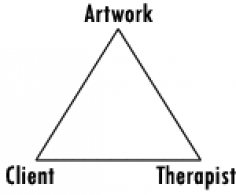Art Therapy
Art Therapy at FreshSteps Independent School
Here at FreshSteps we have the privilege of having our own Art Therapist to provide essential therapy sessions to some of our pupils. Art Therapy happens twice at week at FreshSteps in our designated Art Therapy room. Our therapist is fully qualified to Masters level and is registered with the Health Care and Professions Council (HCPC) and the British Association of Art Therapists (BAAT).
What is Art Therapy?
Art Therapy is a form of psychotherapy which uses art materials and artwork to aid communication. In pyschotherapy, all communication both verbal and non-verbal, is two-way between the therapist and the client (pupil). However, in Art Therapy, communication includes a third dimension, the actual artwork produced by the pupil.

The art therapy process can be experienced as a safer and less threatening and intense than a 'verbal communication' style psychotherapy relationship with the child. Within the art therapy process, the art materials and the images provides a means of expression, holding and recognising confused, difficult and traumatic feelings.
The difference between Art Therapy and art lessons
Art Therapy is not a recreational activity or an opportunity to increase artistic skills. It aims to promote reflection and effect change and growth within oneself, through the use of art materials and in a safe and facilitating environment. The child is not taught how to draw or paint in art therapy, and there is no need to be 'good at art'. The art therapist is not primarily concerned with the aesthetics of artwork, but with how the artwork is made. The way in which the child relates to the artwork may be more important than the finished product.
During the course of art therapy, the child may acquire artistic skills but this is not the primary aim of art therapy and is a secondary effect.
Parents / Carers
FreshSteps asks for written consent from all parents/carers prior to starting any therapeutic work. When working with children and young people, liaising with parents/carers is an important part of the therapeutic work and overall progress. Parents/carers are invited to attend regular review meetings with the art therapist. An information leaflet is also available for parents/carers from reception.
Art Therapy and the pupil
Like all psychotherapy sessions, what is discussed in the art therapy session between the child and the therapist, is confidential. Children need privacy in order to explore difficult feelings. However, the therapist can and will disclosure information on the child on a 'need to know' basis as this can help the school and parents to support the child, manage his or her behaviour or with planning future support. In situations where a child may make a disclosure with information relevant to safeguarding, the therapist is legally obliged to follow the schools safeguarding procedures and report it to the schools designated safeguarding lead.
The art therapist writes reports for each child at the end of every half term and also gives regular verbal feedback to the headteacher. Clinical notes are kept by the therapist at the end of each session with a child. Our Art therapist is available to attend professional meetings when invited.
Some experiences are too painful to express verbally or understand through the medium of verbal communication alone. The artwork produced in art therapy sessions can function as a permanent record which becomes embellished with meaning through its creation. Art therapy sessions are therefore non-directive; the child chooses what to make and what materials to use. Sometimes children choose not to make anything and at other times they choose to use their speech to express their thoughts verbally. The art therapist is trained to deal with a range of communication and being able to express oneself verbally is part of the process.


